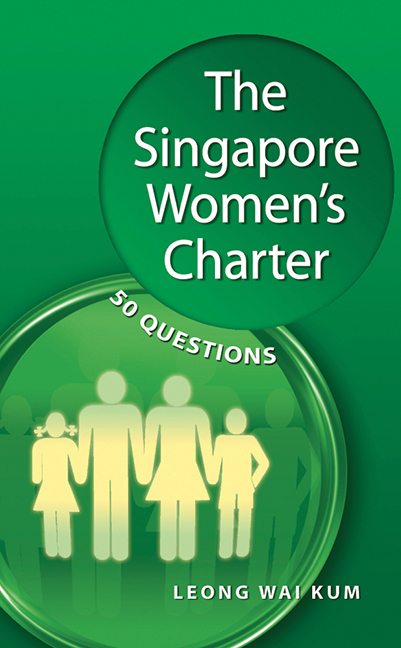Book contents
- Frontmatter
- Contents
- List of Questions
- Foreword
- Preface
- Part I What is the Women's Charter?
- Part II Marriage
- Part III Regulation of Husband-Wife Relationship
- Part IV Regulation of Parent-Child Relationship
- Part V Violence in the Family
- Part VI Divorce and the Process
- Part VII Maintenance
- Part VIII Division of Matrimonial Assets
- Part IX Muslims
- Epilogue
- References
- Index
- About the Author
Preface
Published online by Cambridge University Press: 21 October 2015
- Frontmatter
- Contents
- List of Questions
- Foreword
- Preface
- Part I What is the Women's Charter?
- Part II Marriage
- Part III Regulation of Husband-Wife Relationship
- Part IV Regulation of Parent-Child Relationship
- Part V Violence in the Family
- Part VI Divorce and the Process
- Part VII Maintenance
- Part VIII Division of Matrimonial Assets
- Part IX Muslims
- Epilogue
- References
- Index
- About the Author
Summary
The Women's Charter was enacted through a legislative process that began in 1960. It is, unique among family statutes, closely connected with Singaporeans’ early stirrings of self-government and nation building. To commemorate the fiftieth anniversary of its enactment I am happy to attempt answers to the fifty questions that you might ask of the Women's Charter. In this effort I am greatly assisted by my colleagues, Debbie Ong Siew Ling and Chan Wing Cheong, who also collaborate closely with me in teaching Family Law at the Faculty of Law of the National University of Singapore.
Of the numerous statutes that apply in Singapore today it may be even more important for members of the public to become familiar with the Women's Charter. This statute regulates some of the most important events in our lives including marriage, and our relationships with our closest family members including our parents, spouse and children. As a Family Law academic I am aware of my duty to disseminate what little I know to assist members of the public in understanding this area of the law. In offering answers to these fifty questions I have tried to express the points as simply as possible while avoiding becoming inaccurate.
Beyond the technical content of legal rules that may be of interest only to legal practitioners, the law tells stories about us and holds lessons that we can learn. The Women's Charter tells stories about how we view family life and contains lessons of what we regard to be moral behaviour among family members. If each of us learns these lessons and behaves accordingly, together we build up our familial bonds so they remain strong. Telling stories about our common values in the hope that this encourages moral behaviour is another reason for this little book.
The law keeps changing. This book discusses it as of September 2010.
- Type
- Chapter
- Information
- The Singapore Women's Charter50 Questions, pp. xv - xviPublisher: ISEAS–Yusof Ishak InstitutePrint publication year: 2011



